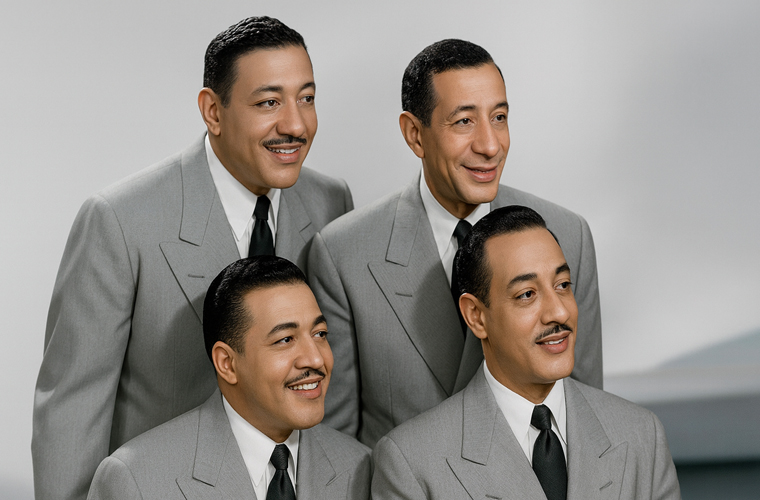Pioneers of Vocal Harmony
The Mills Brothers were one of the most influential African-American vocal groups in American music history, renowned for their seamless harmonies, innovative style, and groundbreaking achievements in a segregated era. Comprising four brothers—John Jr., Herbert, Harry, and Donald Mills—they rose from humble beginnings in Piqua, Ohio, to international stardom, selling over 50 million records and shaping the sound of jazz, pop, and swing for generations. Their career spanned more than five decades, from the Jazz Age of the 1920s through the rock ‘n’ roll era and into the 1990s, making them trailblazers who bridged racial divides in entertainment.
Born into a musical family in the small town of Piqua, about 25 miles north of Dayton, the brothers were the sons of John Sr. and Eathel Harrington Mills. John Sr., a barber by trade, was an amateur singer who often performed spirituals and barbershop quartets in his shop, where the boys honed their skills as children. The eldest, John Mills Jr. (1911–1982), handled bass vocals and guitar; Herbert (1912–1989) sang second tenor; Harry (1913–1982) provided baritone; and the youngest, Donald (1915–1999), served as lead tenor and the group’s charismatic frontman. Their father’s shop became an impromptu stage, fostering a tight-knit sibling bond and a distinctive sound that mimicked instruments—Herbert, in particular, was famed for imitating a trumpet with his voice, a technique born from necessity when their guitarist failed to show up for an early gig.
The group’s professional journey began in the late 1920s when the brothers, still teenagers, started performing on local radio in Cincinnati and later in New York. Signed to Brunswick Records in 1930, they scored their first hit with “Tiger Rag,” a novelty tune that showcased their rhythmic precision and vocal improvisation. That same year, they made history as the first Black artists to host their own national network radio show on CBS, a milestone amid widespread racial barriers. Their smooth, scat-infused style drew comparisons to the era’s big bands, and they quickly became fixtures on the vaudeville circuit, sharing stages with legends like Duke Ellington and Cab Calloway.
By the mid-1930s, the Mills Brothers were bona fide stars. They transitioned to Decca Records, where hits like “Paper Doll” (1943)—which topped the Billboard charts for 13 weeks and sold three million copies—”You Always Hurt the One You Love,” and “Lazy River” cemented their pop dominance. Their recordings blended jazz sophistication with accessible melodies, appealing to diverse audiences. Hollywood beckoned too; they appeared in films such as Twenty Million Sweethearts (1934) and The Big Broadcast of 1936, often performing alongside white stars like Bing Crosby, whom they befriended and collaborated with on several tracks. Despite facing Jim Crow-era discrimination—such as segregated travel and venues—their talent transcended prejudice, earning them the nickname “The Four Kings of Harmony.”
Tragedy struck in 1982 when both John Jr. and Harry died within months of each other—John from a stroke and Harry from a heart attack—leaving Donald and Herbert to carry on with adopted cousin Elbridge Kennedy and saxophonist Gene McShann. The duo toured until Herbert’s passing in 1989, after which Donald continued solo performances into the 1990s, preserving the group’s legacy. Donald’s death in 1999 marked the end of an era.
Inducted into the Vocal Group Hall of Fame in 1998 and awarded a star on the Hollywood Walk of Fame, The Mills Brothers’ influence endures in modern a cappella and vocal jazz. They were not just entertainers but cultural pioneers, proving that Black excellence could command the spotlight. As Donald once reflected, “We sang our way through the color line.” Their timeless recordings continue to enchant, a testament to the unbreakable harmony of brotherhood and artistry

